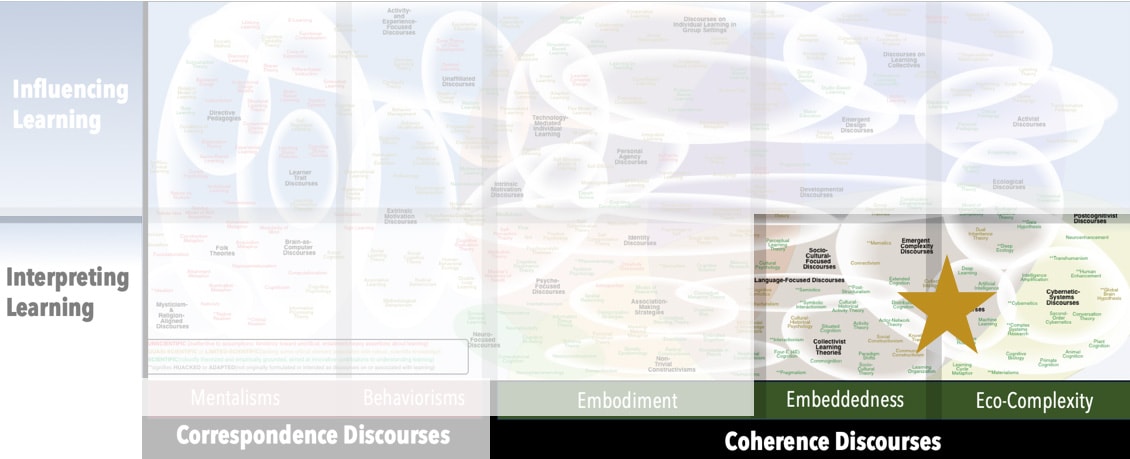Focus
Collaborative human action that exceeds the sum of its partsPrincipal Metaphors
- Knowledge is … the space of current possibility
- Knowing is … productive co-activity
- Learner is … collaborative social system (usually mediated by technology)
- Learning is … expanding the space of the possible
- Teaching is … N/A
Originated
1780s (surge in 2000s)Synopsis
Collective Intelligence is an umbrella notion that reaches across descriptions of, platforms for, and strategies for collaborative efforts to generate knowledge or achieve goals that are unlikely to be realized by any of the participants on their own. A sampling includes:- Collaboratory (William Wulf, 1980s) – originally coined to name a virtual (vs. actual) center, in which geographically dispersed researchers could work together – sharing data, instruments, and other resources digitally. The term has more recently been taken up to refer to any space – actual or virtual – designed to support collaboration on complex problems. associated constructs include:
- Digital Collaboration – a Collaboratory mediated by digital technologies, often involving broad expertise across a large network of participants
- Crowdsourcing – a strategy of meeting material, physical, and conceptual needs through soliciting contributions and assistance from a large population, especially from an online community
- Groupware (Collaborative Software) – a software application that helps individuals collaborate to achieve a common goal, such as simultaneous editing of a single file
- Hive Mind – based on the metaphor of “mind as (the complex dynamics of) a colony of social insects,” a collective effort to address complex questions through the transcendent possibilities of a large group of engaged thinkers
- Human-Based Computation (Human Assisted Computation; Ubiquitous Human Computing; Distributed Thinking) – machine-based outsourcing to humans of elements of a complicated task, based on abilities and costs
- Knowledge Ecosystem – a strategy to foster innovation and improve decision-making through networks of collaboration that are designed according to principles of evolution
- Jury Theorems – a category of mathematics-based models that examine the conditions under which the majority decisions of collectives are correct or “wise”
- Open-Source Software Development – the generation and distribution of robust software through the collaboration of many independent contributors
- Opinion Aggregation – gathering opinions from a crowd, typically involving rating scales, and combining them to provide user, consumers, and other with broad-based reviews
- Organismic Computing – a goal-directed and technology-mediated approach to coordinating participants’ cognitive abilities
- Peer Production (Mass Collaboration) – events involving thousands of individuals, working in open collaboration and enabled by socio-technical systems, to co-generate goods and services
- Shared Mental Model (Team Mental Model) – the extent to which collaborators or co-workers have a compatible conception of their “team” – its qualities, purpose, responsibilities, relationship to a larger organization, etc. There is evident to suggest that coherence and efficiency increase as individuals’ conceptions converge on a common Shared Mental Model.
- Smart Mob – a general notion, used to refer to any group that can mobilize quickly by using digital technologies to coordinate participants’ abilities
- Social Bookmarking – online activity of adding, editing, annotating, and sharing links to online documents
- Swarm Intelligence – broadly, the emergent behavior of any complex system; but, more pragmatically, the application of principles of Complex Systems Research within Artificial Intelligence
- Thought Collective (Ludwik Fleck, 1930s) – a community of like-minded researchers who draw on shared frameworks as they collaborate on the production of new insights
- Wiki – a web-based artefact of collective intelligence, enabled by allowing visitors (with no or minimal vetting) to participate in contributing and editing contents
- Wisdom of Crowds (James Surowiecki, 2000s) – the idea that large groups of people collectively make better decisions or predictions than individuals, even experts. It relies on the diversity of opinions, decentralized knowledge, and the averaging effect of many independent inputs, leading to more accurate outcomes.
Commentary
Criticisms of Collective Intelligence tend to revolve around concerns at the loss of individuality or ownership over personal creations. Such anxieties seem to operate in ignorance of the fact the humanity is a profoundly cooperative, social species. (See Crowd Psychology.)Authors and/or Prominent Influences
DiffuseStatus as a Theory of Learning
Collective Intelligence can and should be construed as a perspective on collective learning. It lacks a robust theoretical core, and so it would be a stretch to characterize it as a theory.Status as a Theory of Teaching
Collective Intelligence is not a theory of teaching.Status as a Scientific Theory
Since Collective Intelligence isn’t really a theory, it can’t be classified as a scientific theory. However, it might be appropriate to describe Collective Intelligence as a proto-theory – that is, a collection of strategies and platforms that may be presenting the conceptual material necessary for a theory. That said, Collective Intelligence already satisfies some of the criteria of a scientific theory, especially with regard to a substantial body of evidence.Subdiscourses:
- Collaboratory
- Crowdsourcing
- Digital Collaboration
- Groupware
- Hive Mind
- Human-Based Computation
- Jury Theorems
- Knowledge Ecosystem
- Open-Source Software Development
- Opinion Aggregation
- Organismic Computing
- Peer Production (Mass Collaboration)
- Shared Mental Model (Team Mental Model)
- Smart Mob
- Social Bookmarking
- Swarm Intelligence
- Thought Collective
- Wiki
- Wisdom of Crowds
Map Location

Please cite this article as:
Davis, B., & Francis, K. (2025). “Collective Intelligence” in Discourses on Learning in Education. https://learningdiscourses.com.
⇦ Back to Map
⇦ Back to List
